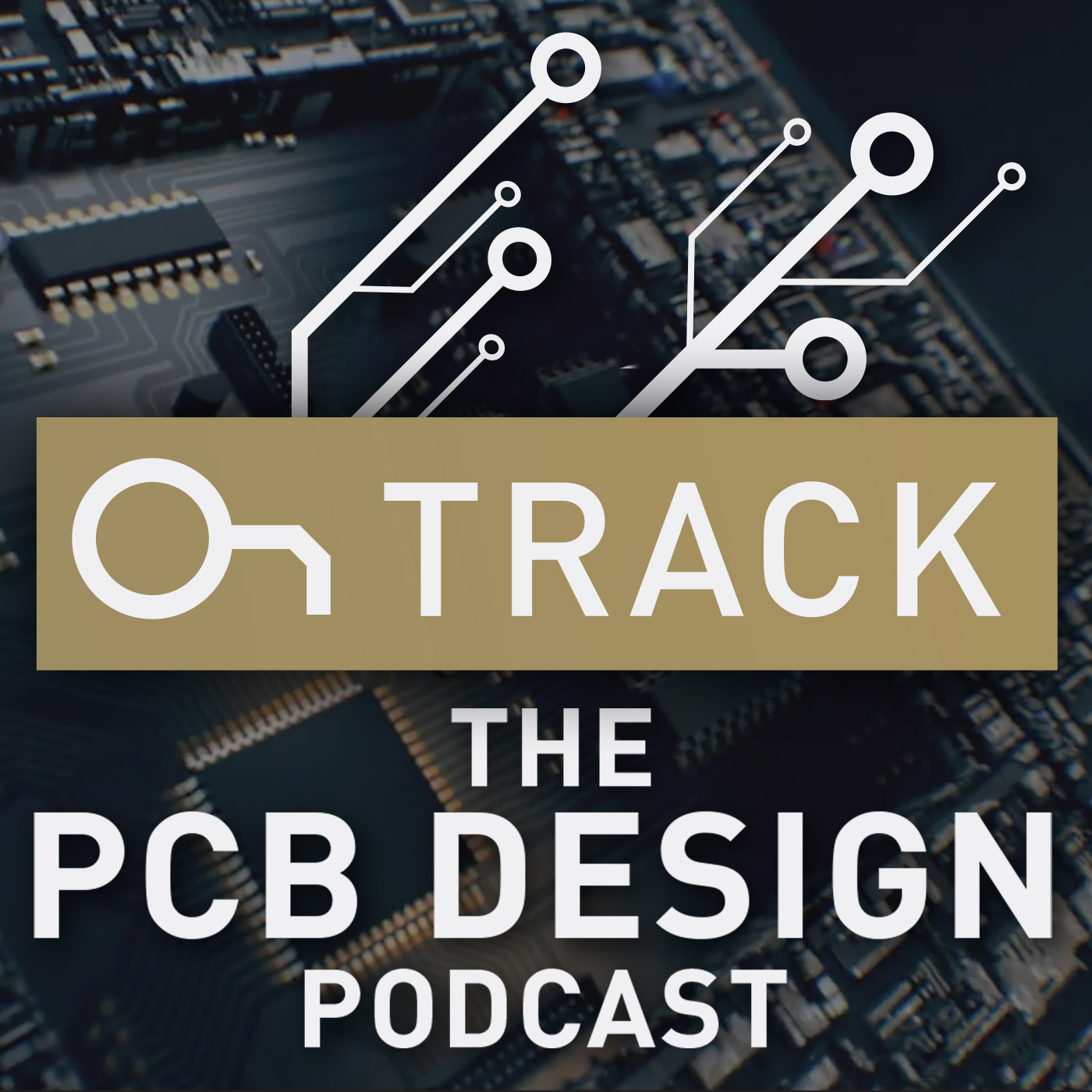Episodes
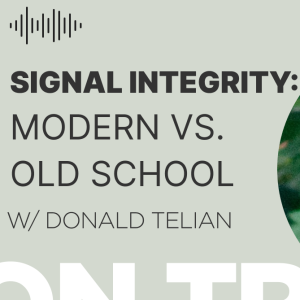
Thursday Jun 20, 2024
Modern vs. Old School Signal Integrity w/ Donald Telian
Thursday Jun 20, 2024
Thursday Jun 20, 2024
Explore the fascinating evolution of signal integrity in PCB design with industry expert Donald Telian. In this episode of the Altium OnTrack podcast, Donald delves into the differences between modern and old school signal integrity, sharing invaluable insights from his illustrious career. Learn about IBIS modeling, high-speed design, and the critical advancements that have shaped the industry.
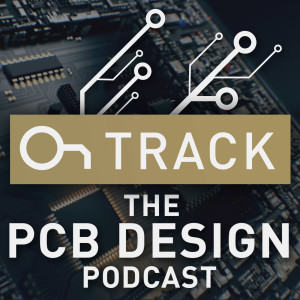
Wednesday Jun 12, 2024
Edge Devices and LLMs: What's Ahead for AI
Wednesday Jun 12, 2024
Wednesday Jun 12, 2024
In this episode of the Altium OnTrack podcast, host Tech Consultant Zach Peterson explores the fascinating world of Edge AI and how Large Language Models (LLMs) fit into the picture with Jan Jongboom, co-founder of Edge Impulse. The two discuss the evolution from GPT-2 to GPT-4, the importance of edge computing, and the hardware requirements for running AI on edge devices. Discover how reducing the size of LLMs enables efficient deployment on edge devices, gain insights into the practical applications of AI in various industries, and learn about EDGE IMPULSE.
More resources:
- Getting started w/ Edge Impulse on Renesas platforms
- Connect with Jan on LinkedIn
- Learn more about Edge Impulse
- Check out a recent video from Edge Impulse: Using GPT-4o to train a 2,000,000x smaller model (that runs directly on device)
- Exclusive 15 Days Free Altium Designer Access
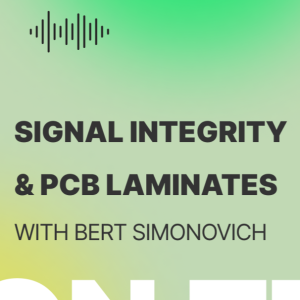
Tuesday Jun 04, 2024
Talking Signal Integrity & PCB Laminates w/ Bert Simonovich
Tuesday Jun 04, 2024
Tuesday Jun 04, 2024
Learn about the complexities of dielectric anisotropy and its implications for high-speed PCB designs in this week’s OnTrack podcast episode. Don't miss this engaging and informative discussion.
Key Takeaways:
- Learn about the different dielectric constants in PCB materials.
- Discover how anisotropic properties affect transmission line modeling in PCB LAMINATES.
- Gain practical knowledge for achieving better signal integrity in your PCB designs
- The critical aspects of signal integrity in modern electronics
More Resources:
- Lansim Enterprises: http://www.lamsimenterprises.com/
- Connect with Bert on LinkedIn
- Check out this article the importance of Signal Integrity for High Speed Designs
- Check out this article about PCB Material Selection
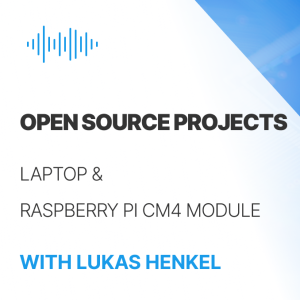
Wednesday May 29, 2024
Open Source Projects Overview: Laptop and Raspberry Pi CM4 Module
Wednesday May 29, 2024
Wednesday May 29, 2024
In this episode of the Altium OnTrack podcast, host Zach Peterson sits down with Lukas Henkel from Open Visions Technology to explore two groundbreaking open source projects: an open source laptop and an alternative to the Raspberry Pi CM4 module.
Discover the latest advancements in OPEN SOURCE hardware and learn how these innovative projects are pushing the boundaries of DIY computing.
Episode Highlights:
- Webcam Design: challenges and innovations in designing an open-source webcam for laptops.
- Laptop Design Challenges: key obstacles faced during the development of an open-source laptop.
- Lessons Learned from Laptop Project: insights and takeaways from working on the open-source laptop project.
- Advice for Taking On This Kind of Project: recommendations and guidance for individuals looking to start similar projects.
- Open Source Raspberry Pi Overview and Demo: overview and demonstration of using Raspberry Pi in open-source projects.
More Resources:
- Check out our previous podcast episode with Lukas Henkel
- Open Source Laptop Project
- Pi.MX8 Project
- Follow Lukas on LinkedIn
- Follow Open Visions on LinkedIn
-
Exclusive 15 Days Free Altium Designer Access
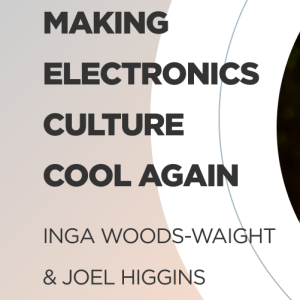
Tuesday May 21, 2024
Making Electronics Culture Cool Again: The Circuit Pulse Show
Tuesday May 21, 2024
Tuesday May 21, 2024
Welcome to the OnTrack Podcast! In this episode, we dive deep into the vibrant electronics culture with special guests Inga Woods-Waight and Joel Higgins from the Circuit Pulse Show. Discover how they are making ELECTRONICS CULTURE and tech fun and accessible, engaging younger audiences, and revolutionizing educational content in the electronics industry. If you're passionate about electronics design and want to stay updated on industry trends, this episode is a must-watch!
Key Takeaways:
• PCB design insights and tips
• Engaging content for the electronics community
• The rise of educational electronics videos
• Inga and Joel's journey and success stories
More Resources:
- Follow Inga Woods-Waight on LinkedIn
- Octopart's YouTube Channel
- Check Out Full Episodes of the Circuit Pulse Show
- Interested in the topic of electronics culture? Check out this past episode of OnTrack on the topic of microelectronics.
- Exclusive 15 Days Free Altium Designer Access

Tuesday May 14, 2024
Envisioning an Energy Efficient Tech Future
Tuesday May 14, 2024
Tuesday May 14, 2024
Join host Zach Peterson on The OnTrack Podcast as he has a fascinating conversation with Greg Bailey, President of GreenArrays, Inc. Discover the innovative ways technology is advancing towards a more energy-efficient future. In this episode, we explore the impact of IoT and AI on energy consumption, the challenges of power management in tech, and the solutions that are shaping a sustainable world.
Episode Highlights:
- The role of IoT in leading toward an ENERGY EFFICIENT TECH FUTURE.
- Insights into AI's impact on power usage across industries.
- Greg Bailey's expert take on supervisory control systems and their benefits.
- Strategies for reducing energy waste in everyday tech applications.
More Resources:
- Learn More about GreenArrays, Inc
- Learn More about Charles Moore
- Connect with Greg Bailey: greg@greenarraychips.com
- Exclusive 15 Days Free Altium Designer Access:

Tuesday May 07, 2024
EMC Troubleshooter Min Zhang on Measuring Ground w/ Voltage & Current
Tuesday May 07, 2024
Tuesday May 07, 2024
Join Tech Consultant Zach Peterson on this episode of the Altium OnTrack podcast where EMC troubleshooting expert Min Zhang explores the complexities of measuring ground in electronic systems using both voltage and current methods. With his profound expertise and practical insights, Min provides a comprehensive breakdown of the techniques and tools necessary for accurate measurements, especially in high-power applications.
Episode Highlights:
- In this episode you'll learn:
- The impact of frequency on the cost and selection of multi-gigahertz probes.
- Detailed explanations of VOLTAGE TESTING and MEASURING GROUND techniques in EMC applications.
- Insights into the challenges and solutions for measuring high-frequency transient events.
- What the technical challenges are in measuring GROUNDING SYSTEMS using differences between circuit points.
- The importance of selecting the right probe based on voltage levels and measurement environment.
- Techniques to minimize noise and ensure accurate readings in noisy industrial environments.
Further Resources:
- Connect with Min Zhang on LinkedIn
- EMC and Compliance International is the UK's premier independent trade show specializing in every facet of electromagnetic compatibility (EMC) and compliance. It features exhibitors from a variety of sectors such as electronics, electrical, industrial, aerospace, medical, and military. Check out their website here.
- Information on EMC and Compliance International's Training Program
- Exclusive 15 Days Free Altium Designer Access

Wednesday May 01, 2024
Intro EMC: Compliance, Opportunities & Pitfalls with Anton Tishchenko
Wednesday May 01, 2024
Wednesday May 01, 2024
On this episode of the OnTrack Podcast, Tech Consultant Zach Peterson welcomes Anton Tishchenko, aka Dr. EMC on YouTube. The two explore the intricacies of EMC design, certification, and compliance.
They chat about various aspects of EMC testing, common mistakes in PCB design, AI-integration, and how modules and antennas play a huge role in EMC compliance. Anton also shares his journey into EMC, how to approach design testing effectively, and insights into his fascinating PhD research.
Key Highlights:
• Strategies for effective EMC compliance
• Common mistakes in PCB design and how to avoid them
• The role of AI in PCB design checks
• EMC testing has a 50% failure rate on first attempts.
• Comprehensive design strategies can prevent costly EMC failures.
• Modules and antenna setups can greatly impact EMC compliance.
More Resources:
- Learn More about Anton's PCB Tool
- Connect with Anton on LinkedIn
- Check Out the Dr. EMC YouTube Channel
- Anton's university page
- Exclusive 15 Days Free Altium Designer Access
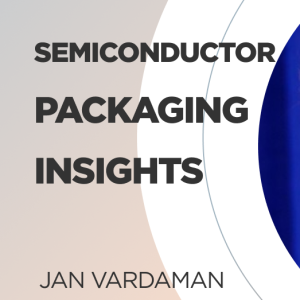
Tuesday Apr 23, 2024
Unpacking Semiconductor Packaging: Insights with Jan Vardaman
Tuesday Apr 23, 2024
Tuesday Apr 23, 2024
In this episode of the Altium OnTrack Podcast, host Zach Peterson sits down with Jan Vardaman, president and founder of TechSearch International. With decades of experience in semiconductor packaging, Jan shares her expert insights into the global semiconductor industry, focusing on the shift away from Asia for advanced manufacturing and the critical need for an integrated supply chain in the U.S.
This episode not only highlights the technological and industrial shifts in semiconductor packaging but also discusses the economic and policy dimensions affecting the sector.
Key topics covered include:
- The transition of high-end semiconductor packaging from Asia to other regions like Taiwan and Korea.
- The impact of new facilities in Malaysia on the global supply chain.
- The role and challenges of the National Advanced Packaging Manufacturing program in the U.S.
- Detailed discussions on substrate manufacturing and advanced assembly operations outside China.
- The significance of workforce development in sustaining local manufacturing initiatives.
- Future trends and strategies for semiconductor fabrication and assembly in North America.
More Resources:
- Follow Jan on LinkedIn
-
Learn More about TechSearch International
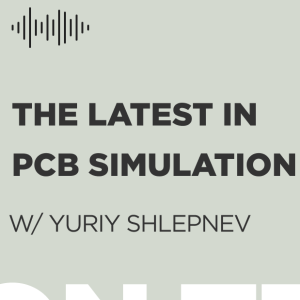
Tuesday Apr 16, 2024
The Latest in PCB Simulation: Expert Insights with Yuriy Shlepnev
Tuesday Apr 16, 2024
Tuesday Apr 16, 2024
In this information-packed episode of the OnTrack Podcast, Tech Consultant Zach Peterson explores PCB simulation with Yuriy Shlepnev, the President and Founder of Simberian Inc. This detailed discussion focuses on how modern simulation tools are revolutionizing the industry and includes an exclusive Simbeor® demo that you won't want to miss.
To begin, Yuriy shares his extensive knowledge of electromagnetic analysis and signal integrity, exploring how these critical factors influence PCB design in today's high-speed electronics. The episode then covers various aspects of PCB simulation, including the challenges designers face and the innovative solutions provided by the latest software developments - all before diving into the demo.
Key Highlights:
• The importance of accurate electromagnetic simulations in achieving optimal PCB design. Insights into Simberian's approach to simplifying complex simulations for designers of all skill levels.
• Techniques to enhance signal integrity and reduce design iterations.
• Future trends in PCB technology and how to stay ahead in the industry.
• Yuriy's Simbeor® demo, showing practical applications and tips for both novice and experienced engineers.
Further Resources:
- Connect with Yuriy on LinkedIn
- Learn More about Simberian
- Exclusive 15 Days Free Altium Designer Access

Tuesday Apr 09, 2024
Behind the Tech: Passion & Perseverance in Electronics Design
Tuesday Apr 09, 2024
Tuesday Apr 09, 2024
In this captivating episode of the OnTrack Podcast, host Tech Consultant Zach Peterson chats about storytelling in electronics design with Benjamin Kitzinger, the visionary Producer and Director behind @AltiumStories .
Zach and Ben explore the heartbeat of innovation by detailing stories of engineers and innovators who've shaped the electronics industry with their passion and perseverance. Discover how a hacker mindset led to groundbreaking technological advancements and hear firsthand accounts of how tech pioneers navigated challenges, celebrated triumphs, and fueled their creativity to make a tangible impact on the world through electronics design.
Don't forget to subscribe for more stories of innovation, interviews with industry leaders, and explorations into the technology that shapes our future.
Key Highlights
- Corporate Storytelling with Impact: Altium Stories redefines corporate storytelling by focusing less on product promotion and more on showcasing the real-world impact of engineering solutions.
- Exploring Unique Personalities: Highlighting individuals like Joe Grant, known for his hacker mindset, Altium Stories delves into the personal journeys and unique perspectives of engineers, creating captivating narratives.
- Educational and Inspirational Content: Through interviews and deep dives, the series aims to educate and inspire viewers, particularly engineers, by sharing the challenges, triumphs, and innovations within the field of electrical engineering.
- Humanitarian and Technological Impact: From groundbreaking technological advancements like optical computing to humanitarian projects like Project Vive, Altium Stories showcases the diverse ways engineering can positively impact lives.
- Authenticity and Evolution: Despite being a corporate initiative, Altium Stories maintains authenticity and evolves over time to continue providing valuable content, aiming to educate, inspire, and celebrate engineering accomplishments while staying true to its essence.
Further Resources
- Connect with Ben on LinkedIn
- Check Out Altium Stories on YouTube

Tuesday Apr 02, 2024
Chatting Ultra HDI: Chrys Shea, PCB Miniaturization & Challenges Ahead
Tuesday Apr 02, 2024
Tuesday Apr 02, 2024
In this episode of the OnTrack Podcast, host Tech Consultant Zach Peterson explores the revolutionary world of Ultra HDI with Chrys Shea, President of Shea Engineering. The two unveil the future of PCB soldering and miniaturization, shedding light on the intricate challenges ahead and breakthroughs just on the horizon. Chrys, renowned for her expertise, shares invaluable insights into developing test vehicles for soldering and navigating the complexities of Ultra HDI assembly. This conversation promises a deep understanding of the cutting-edge advancements shaping the future of electronics manufacturing.
Don't miss out on the expert guidance and innovative strategies presented by Chrys Shea, a leading voice in the SMT assembly and PCB design world.
Key Highlights:
- Introduction of Chrys Shea, president of Shea Engineering, discussing her involvement in developing test vehicles for soldering, particularly focusing on Ultra High-Density Interconnect (UHDI).
- Discussion on the importance of having a plan upfront, particularly in terms of addressing defects and DFM (Design for Manufacturability) considerations.
- Chrys Shea's background as an SMT (Surface Mount Technology) assembly process engineer and her transition to independent consulting, specializing in soldering.
- Overview of the test vehicle developed for solder paste printing and its evolution to accommodate various soldering processes and component sizes, including BGAs, QFNs, and smaller passives.
- Introduction of the new test vehicle for UHDI assembly, highlighting the increased density and challenges such as off-axis placements and the leading edge effect in stencil printing.
Further Resources:
- Connect with Chrys on LinkedIn
- Learn More about Shea Engineering Services
- Read this article to learn about the assembly process for minaturization and Ultra HDI Technology
- Exclusive 15 Days Free Altium Designer Access

Tuesday Mar 26, 2024
The Critical Shift: Bridging the Generational Gap in PCB Design
Tuesday Mar 26, 2024
Tuesday Mar 26, 2024
In this episode of the OnTrack Podcast, host Zach Peterson speaks with Cory Blaylock, Director of Workforce Partnerships at IPC, in a profound discussion on the looming generational gap within the PCB design and electronics manufacturing spaces, as well as what those industries might be able to do about it. As one generation of seasoned experts nears the end of their careers, the urgency to cultivate a new wave of talent becomes ever more critical. This episode delves deep into the challenges and opportunities that lie ahead in bridging this divide.
Key Highlights:
- The Generational Shift: Explore the evolving landscape of PCB design and how the departure of experienced professionals is creating an urgent need for fresh talent.
- IPC's Role: Discover how IPC is spearheading initiatives to develop the workforce of tomorrow through innovative apprenticeship programs approved by the US Department of Labor.
- The Journey from Classroom to Industry: Cory shares his unique transition from education to a pivotal role in workforce development, shedding light on the path that lies ahead for aspiring PCB designers and manufacturers. - Future-Proofing the Industry: Learn about the measures being taken to ensure the sustainability and growth of the electronics manufacturing sector amidst these changes.
Further Resources:
- Follow Cory Blalock on LinkedIn
- IPC Apprenticeship Information:
- IPC Information for employers
- IPC News releases
- Check out this article about working with IPC compliant Footprint Models
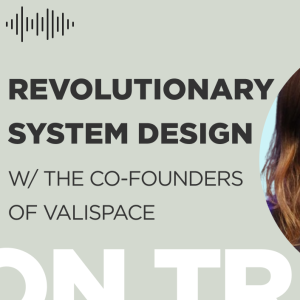
Tuesday Mar 19, 2024
Revolutionary System Design: How Valispace is Changing Engineering
Tuesday Mar 19, 2024
Tuesday Mar 19, 2024
In this episode of The OnTrack Podcast, Tech Consultant Zach Peterson chats with the co-founders of Valispace, Louise Lindblad and Marco Witzmann. Valispace is revolutionizing the engineering world by transforming system design tools, making them more efficient, connected, and capable of handling the complex requirements of today's engineering challenges.
Learn how, from satellite engineering to the intricate demands of aerospace and beyond, Valispace's unique approach empowers engineers to build better, more innovative products by bridging the gap between requirements, design, and implementation.
Key Highlights:
- Louise & Marco's Backgrounds: Introduction of Louise and Marco, highlighting their professional backgrounds and expertise.
- Valispace Background & Intent: Overview of the origins of Valispace, including the initial purpose and intentions behind its development.
- Spreadsheet Pains: Discussion on the challenges and limitations associated with using spreadsheets for engineering and project management tasks.
Further Resources:
- Connect with Louise and Marco on LinkedIn
- Watch this webinar to learn more about the Altium 365 requirements manager powered by Valispace
- Exclusive 15 Days Free Altium Designer Access
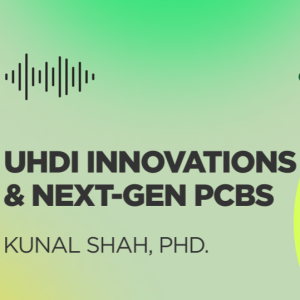
Tuesday Mar 12, 2024
UHDI Innovations & Next-Gen PCBs with Kunal Shah, PhD.
Tuesday Mar 12, 2024
Tuesday Mar 12, 2024
In this enlightening episode of the OnTrack Podcast, host Zach Peterson chats with Kunal Shah, PhD., President of liloTree. The two have a detailed conversation about the burgeoning field of Ultra High-Density Interconnects (UHDI) and its impact on the future of electronics.
Kunal shares his insights on the latest in UHDI innovation, including its challenges and solutions in electronics manufacturing, especially in high-reliability applications such as defense and medical electronics.
With a focus on the upcoming SMTA panel discussion, this episode is a must-watch for anyone interested in the cutting-edge technologies shaping our world. Don't miss out on this deep dive into UHDI!
Key Highlights:
- Overview of the various of Developments in UHDI
- Discussion of "Traditional" Plating Materials
- Nickel Vs. Copper
- Overplating Compensation?
- Can silver be an UHDI Alternative?
More resources:
- Learn More about liloTree
- Check out this article about Ultra HDI PCB capabilities
- Exclusive 15 Days Free Altium Designer Access

Tuesday Mar 05, 2024
ESG, Sustainability, & the Future of Electronics w/ Tom Raftery
Tuesday Mar 05, 2024
Tuesday Mar 05, 2024
Explore the intersection of technology and sustainability with Tom Raftery, an independent consultant and host of the Climate Confident and Sustainable Supply Chain podcasts, on this episode of the OnTrack Podcast with Zach Peterson.
Dive deep into the evolving world of ESG (Environmental, Social, Governance), exploring how advancements in IoT, AI, and sustainable practices are reshaping supply chains and business strategies. Join Tom and Zach as they explore the critical role of transparency, auditability, and regulation in driving forward sustainable innovation and corporate responsibility.
Key Highlights
- Tom Raftery's Introduction: Gain insights into Tom Raftery's expertise and perspective on sustainability.
- Corporate Concern: Explore the question of whether companies are genuinely demonstrating concern for sustainability.
- Procurement & Sourcing: Delve into the critical role of procurement and sourcing in sustainability efforts.
- Transparency Importance: Understand the significance of transparency in sustainable practices and corporate operations.
- Driving Forces of Sustainability: Explore the real motivations behind sustainability initiatives and their impact on businesses.
Resources
-
Listen to the Climate Confident Podcast
-
Learn More about Sustainable Supply Chain
-
Tom Raftery’s website

Tuesday Feb 27, 2024
PCBs, Global Innovation Policy & the CHIPS Act
Tuesday Feb 27, 2024
Tuesday Feb 27, 2024
Explore the intersection of Global Innovation Policy and the CHIPS Act with Stephen Ezell, VP of Global Innovation Policy at the Information Technology and Innovation Foundation (ITIF), in this insightful episode of the OnTrack Podcast.
Hosted by Tech Consultant Zach Peterson, this discussion delves into the complexities of navigating the Chinese market, the principles of comparative advantage, and the critical role of policy in fostering technological self-sufficiency. Discover how the CHIPS Act aims to bolster the electronics industry and innovation within the global tech landscape.
Key Highlights:
- ITIF's Role and Background: Explore the foundation and mission of ITIF, shedding light on its significance in policy discourse.
- Hardware vs. Software in Policy: Delve into the nuances of hardware and software considerations for policymakers, shaping discussions on technological advancement and regulation.
- CHIPS and Science Act: Examine ITIF's involvement in the CHIPS and Science Act, emphasizing its implications for innovation and industry development.
- Global CHIPS Act Comparisons: Compare the CHIPS Act with similar initiatives worldwide, providing insight into its effectiveness and relevance on a global scale.
- Policy Perspectives on Economic Dynamics: Analyze key questions surrounding industrial policies, including the CHIPS Act's role, potential handouts, and the broader implications for economic strategies like onshoring and friendshoring, in the context of China's economic evolution.
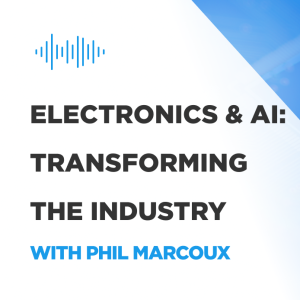
Wednesday Feb 21, 2024
Innovations in AI: Transforming the Electronics Industry
Wednesday Feb 21, 2024
Wednesday Feb 21, 2024
On this episode of the OnTrack Podcast, we welcome Phil Marcoux, Advisor to the Printed Circuit Engineering Association (PCEA). Phil is gearing up for a fascinating webinar on AI in the electronics industry, so we thought we'd chat with him about what sees as the most potentially transformative aspects of this revolution in the electronics space.
Listen/watch to discover how Innovations in AI are transforming the electronics industry, reshaping everything from design to production. Phil and host, Tech Consultant Zach Peterson, explore real-world applications, the importance of data for AI's success, and how the industry is moving towards a more interconnected and intelligent (pun intended) future.
Key Highlights
- AI & Electronics Design: Explores the symbiotic relationship between artificial intelligence and electronics design, highlighting how AI is revolutionizing the field.
- Are We in an AI Bubble?: Raises critical inquiry into whether the current surge in AI development constitutes a bubble, prompting reflection on the sustainability and potential pitfalls of AI advancement.
- AI Can't Read Your Mind: Discusses the inherent limitations of AI in deciphering human thoughts and intentions, emphasizing the distinction between AI capabilities and human cognition.
- Trends from the Early Days of AI: Examines trends emerging from the early stages of AI development, providing valuable insights into its evolution and predicting potential future trajectories.
- A Potential Role for AI: Speculates on the future landscape of electronics design with AI integration, envisioning potential applications and transformative impacts on the industry.
Further Resources
- Sign up for Phil's FREE Webinar
- Connect with Phil Marcoux
- Check out more episodes of the OnTrack Podcast
- Take advantage of exclusive 15 Days Free Altium Designer Access
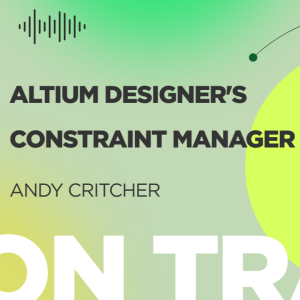
Tuesday Feb 13, 2024
Deep Diving Into Altium Designer's New Constraint Manager
Tuesday Feb 13, 2024
Tuesday Feb 13, 2024
Today we're diving head-first into Altium's New Constraint Manager with Andy Critcher, Director at Total Board Solutions. This revolutionary feature is designed to streamline and optimize the process of applying design constraints across multiple nets, making it easier and more intuitive than ever.
If you're dealing with high-voltage designs, complex multi-layer boards, or simply looking to enhance productivity, the new Constraint Manager offers a suite of tools that promise to elevate your design workflow.
Join Andy and host Tech Consultant Zach Peterson as they chat the ins and outs of this innovative feature, including industry responses, practical applications, and a detailed exploration of how it can simplify your design process.
Key Highlights:
- Andy's Background: Insight into Andy's experience and expertise in the industry.
- Advice for Young People Entering the Industry: Key advice for newcomers navigating the field.
- Fusion of EE and PCB Layout Positions? Discussion on the evolving roles within the industry.
- Eye-Opening Fab Facility Visits: Experiences and revelations from visiting fabrication facilities.
- Altium Designer's New Constraint Manager Overview: Overview and benefits of Altium Designer's Constraint Manager update.
Links & Resources:
- Follow Andy on LinkedIn
- Learn more about Altium Designer's New Constraint Manager
- Interested in becoming a PCB designer? Read this article to learn more about entering the field.
- PCB Library Management from Total Board Solutions
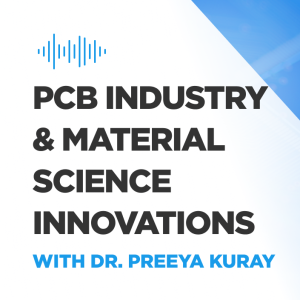
Tuesday Feb 06, 2024
PCB Industry & Material Science Innovations w/ Dr. Preeya Kuray
Tuesday Feb 06, 2024
Tuesday Feb 06, 2024
In this episode of the OnTrack Podcast, we chat with Dr. Preeya Kuray, a renowned material scientist at AGC Multi Materials. Dr. Kuray and Tech Consultant Zach Peterson explore some of the latest developments in the PCB industry, as well as a few material science innovations. Dr. Kuray shares her insights on the evolving landscape of printed circuit boards and the groundbreaking material science developments shaping the future of electronics.
From discussing AGC's pioneering work in low-loss copper-clad laminates and RF materials to exploring the potential of glass in chip packaging, this episode offers a glimpse of where the industry is headed.
Check out this episode for discussions on the synergy between PCB design and material science, the impact of legislative measures like the CHIPS Act on the industry, and the future projects AGC is spearheading to drive technological advancements.

